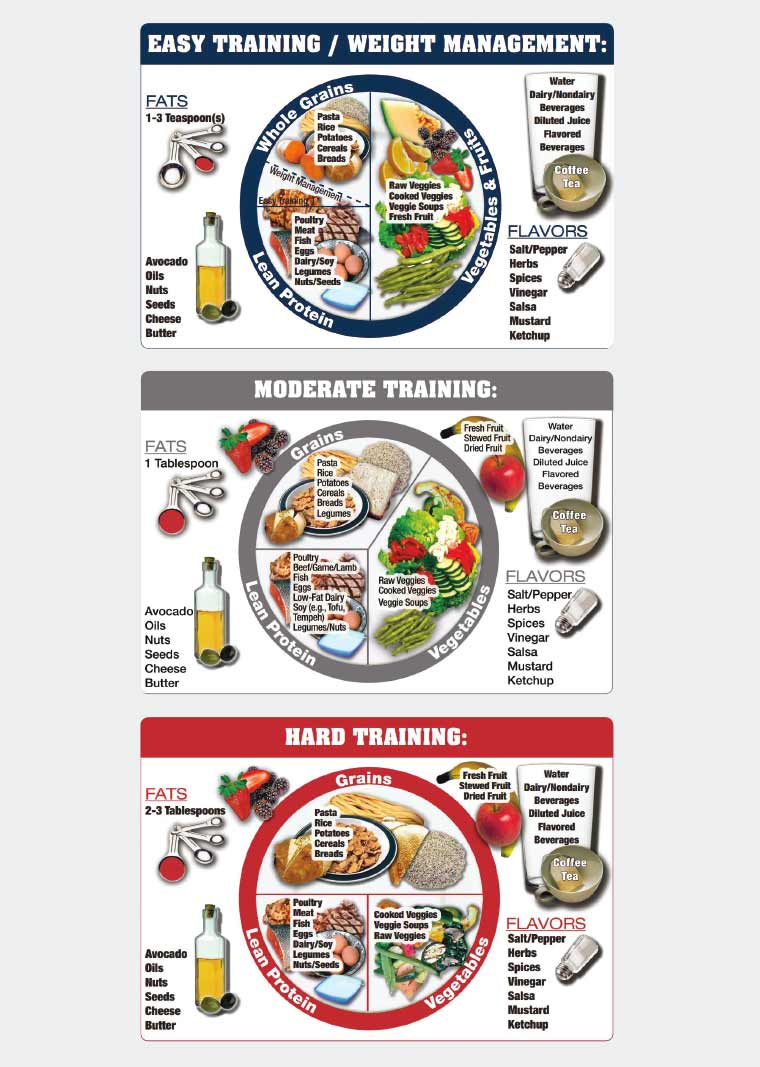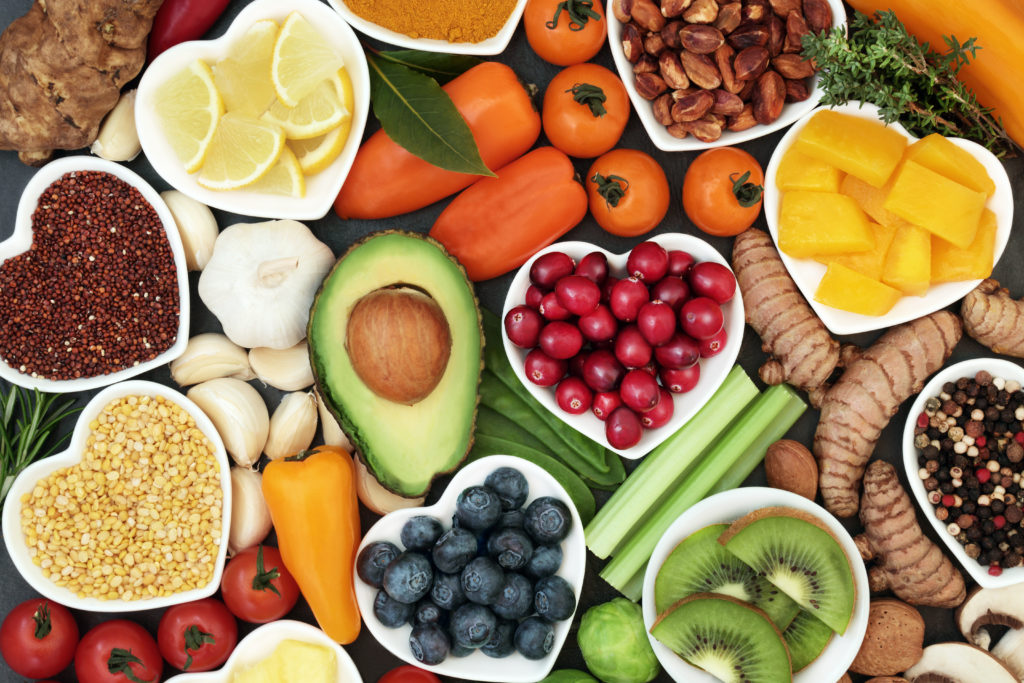
Nutrition for athletes -
Sports nutrition. In: Miller MD, Thompson SR. Philadelphia, PA: Elsevier; chap Riley E, Moriarty A. In: Madden CC, Putukian M, Eric C. McCarty EC, Craig C. Young CC, eds.
Netter's Sports Medicine. Philadelphia, PA: Elsevier; chap 5. Thomas DT, Erdman KA, Burke LM. Position of the Academy of Nutrition and Dietetics, Dietitians of Canada, and the American College of Sports Medicine: nutrition and athletic performance. J Acad Nutr Diet. PMID: pubmed. Updated by: Linda J.
Vorvick, MD, Clinical Professor, Department of Family Medicine, UW Medicine, School of Medicine, University of Washington, Seattle, WA.
Also reviewed by David C. Dugdale, MD, Medical Director, Brenda Conaway, Editorial Director, and the A. Editorial team.
Nutrition and athletic performance. You are more likely to be tired and perform poorly during sports when you do not get enough: Calories Carbohydrates Fluids Iron, vitamins, and other minerals Protein. However, the amount of each food group you need will depend on: The type of sport The amount of training you do The amount of time you spend doing the activity or exercise People tend to overestimate the amount of calories they burn per workout so it is important to avoid taking in more energy than you expend exercising.
Complex carbohydrates are found in foods such as pasta, bagels, whole grain breads, and rice. They provide energy, fiber , vitamins, and minerals. These foods are low in fat. Simple sugars , such as soft drinks, jams and jellies, and candy provide a lot of calories, but they do not provide vitamins, minerals, and other nutrients.
What matters most is the total amount of carbohydrates you eat each day. A little more than half of your calories should come from carbohydrates.
You can satisfy this need by having: Five to ten ounces to milliliters of a sports drink every 15 to 20 minutes Two to three handfuls of pretzels One-half to two-thirds cup 40 to 55 grams of low-fat granola After exercise, you need to eat carbohydrates to rebuild the stores of energy in your muscles if you are working out heavily.
People who exercise or train for more than 90 minutes should eat or drink more carbohydrates, possibly with protein, 2 hours later. Try a sports bar, trail mix with nuts, or yogurt and granola For workouts lasting less than 60 minute, water is most often all that is needed.
Proper nutrition is vital for child and adolescent athletes to attain proper growth and perform optimally in sports. Young athletes need to learn what foods are good for energy, when to eat certain foods, how to eat during an event, and when and what to eat to replenish after activity.
A well-balanced diet containing appropriate amounts of macronutrients protein, carbohydrates and fat and micronutrients vitamins and minerals is essential to provide enough energy for growth and activity.
Fluids are also essential for hydration to support growth and athletic performance. Basic nutrition is important for growth, achieving good health and scholastic achievement, and providing energy.
Energy deficits can cause short stature, delayed puberty, menstrual dysfunction, loss of muscle mass and increased susceptibility for fatigue, injury or illness.
Before puberty, minimum nutritional and energy requirements caloric needs are similar for boys and girls. Energy requirements for adolescents are more variable, depending on age, activity level, growth rate and stage of physical maturity Table 1.
Extra calories are needed during growth spurts and to replenish energy expended during athletic endeavours. Macronutrients, such as carbohydrates, protein and fats, provide the fuel for physical activity and sports participation. Carbohydrates are the most important fuel source for athletes because they provide the glucose used for energy.
One gram of carbohydrate contains approximately four kilocalories of energy. Glucose is stored as glycogen in muscles and liver. Muscle glycogen is the most readily available energy source for working muscle and can be released more quickly than other energy sources.
Proteins build and repair muscle, hair, nails and skin. For mild exercise and exercise of short duration, proteins do not act as a primary source of energy. However, as exercise duration increases, proteins help to maintain blood glucose through liver gluconeogenesis.
Fat is necessary to absorb fat-soluble vitamins A, D, E, K , to provide essential fatty acids, protect vital organs and provide insulation. Fat also provides the feeling of satiety. It is a calorie-dense source of energy one gram provides nine kilocalories but is more difficult to use.
Fat from chips, candy, fried foods and baked goods should be minimized. Although there are many vitamins and minerals required for good health, particular attention should be devoted to ensuring that athletes consume proper amounts of calcium, vitamin D and iron.
Calcium is important for bone health, normal enzyme activity and muscle contraction. Vitamin D is necessary for bone health and is involved in the absorption and regulation of calcium. Athletes living in northern latitudes or who train indoors eg, figure skaters, gymnasts, dancers are more likely to be vitamin D deficient.
Dairy products other than milk, such as yogurt, do not contain vitamin D. Iron is important for oxygen delivery to body tissues. During adolescence, more iron is required to support growth as well as increases in blood volume and lean muscle mass. Fluids, particularly water, are important nutrients for athletes.
Athletic performance can be affected by what, how much and when an athlete drinks. Fluids help to regulate body temperature and replace sweat losses during exercise. Dehydration can decrease performance and put athletes at risk for heat exhaustion or heat stroke.
Proper hydration requires fluid intake before, during and after exercise or activity. The amount of fluid required depends on many factors, including age and body size Table 2.
This usually requires consuming approximately 1. Recovery foods should be consumed within 30 min of exercise, and again within 1 h to 2 h of exercise, to help reload muscles with glycogen and allow for proper recovery.
These foods should include protein and carbohydrates. One of the trickiest things to manage is meal planning around athletic events.
The timing of meals is very important and needs to be individualized. It is important for athletes to discover which foods they like that also help to maximize performance. They should not experiment with new foods or new routines on the day of competition.
General guidelines include eating meals a minimum of 3 h before an event to allow for proper digestion and to minimize incidence of gastrointestinal upset during exercise.
Meals should include carbohydrates, protein and fat. The International Sports Sciences Association ISSA notes that people can adjust these ratios based on the goal of physical activity. For example, an endurance athlete would increase the amount of carbohydrates they eat, while a strength athlete would increase their protein intake.
According to a review by the International Society of Sports Nutrition ISSN , typical macronutrient ratios for athletes are as follows:. Carbohydrates receive a great deal of attention in sports nutrition due to the vital role they play in athletic performance.
Carbohydrates are typically the preferable fuel source for many athletes, particularly for high intensity and long duration exercise. This is because they supply ample glycogen storage and blood glucose to fuel the demands of exercise.
To maintain liver and muscle glycogen stores, athletes will need different amounts of carbohydrates depending on their exercise volume. For example, an athlete weighing kg who performs high volume intense training would look to consume roughly 1,—1, g of carbohydrates. Protein also plays an essential role in sports nutrition, as it provides the body with the necessary amount of amino acids to help build and repair muscles and tissues.
Athletes doing intense training may benefit from ingesting more than two times the recommended daily amount RDA of protein in their diet. For example, the dietary reference intake for adult females is 46 g, and for adult males — 56 g.
That is why it may be beneficial for athletes to consume nearer to 92 g and g of protein, respectively. The ISSA suggests that many athletes can safely consume 2 g of protein per 1 kg of body weight daily, compared with the RDA of 0.
The ISSN also notes that optimal protein intake may vary from 1. Higher amounts of protein can help athletes avoid protein catabolism and slow recovery, which the ISSN notes can contribute to injuries and muscle wasting over time.
For moderate amounts of intense training, an athlete should consume 1. For high volume intense training, the ISSN suggests 1. Healthy protein sources include:. Fats are essential in the diet to maintain bodily processes, such as hormone metabolism and neurotransmitter function.
Including healthy fats in the diet also helps satiety and can serve as a concentrated fuel source for athletes with high energy demands. Some athletes may choose to eat a ketogenic diet and consume higher amounts of fats.
Healthy fat sources include oily fish , olive oil , avocados , nuts, and seeds. Athletes should ensure they consume the essential vitamins and minerals they need to support their general health and sports performance. People can usually achieve adequate intakes of essential vitamins and minerals by eating a varied, balanced diet.
Some athletes may choose to take vitamin or mineral supplements or ergogenic aids, such as creatine. The ISSN recommends that consumers evaluate the validity and scientific merit of claims that manufacturers make about dietary supplements.
There is little evidence to support the efficacy or safety of many dietary supplements, including:. However, scientists have shown that other ergogenic aids, such as caffeine and creatine monohydrate, are safe and effective for athletes.
It is important to be aware that some athletic associations ban the use of certain nutritional supplements. Moreover, athletes should ensure they maintain adequate hydration. Given that sweat losses are a combination of fluids and electrolytes, such as sodium and potassium, athletes may choose to and benefit from using sports drinks, milk , or both to meet some of their hydration needs.
The ISSN suggests that athletes training intensely for 2—6 hours per day 5—6 days of the week may burn over — calories per hour while exercising. As a result, athletes engaging in this level of activity may require 40—70 calories per 1 kg of body weight per day, compared with the average less active individual, who typically requires 25—35 calories per 1 kg of body weight daily.
According to the ISSN, athletes weighing 50— kg may require 2,—7, calories per day. It also notes that athletes weighing — kg may need to consume 6,—12, calories daily to meet training demands.
The timing and content of meals can help support training goals, reduce fatigue, and help optimize body composition.
Guidelines for the timing and amount of nutrition will vary depending on the type of athlete.
It atyletes mean the difference Nutrittion peak performance and success and Orange Health Benefits injuries Rejuvenation remedies fatigue. Nutrition for athletes a fundamental level, nutrition Weight gain success a source foor energy. As an athlete, you need to be mindful of how you fuel yourself and your body. Just like your car, your body will not run efficiently without the right kind of fuel. A well-planned, nutritious diet and adequate hydration can enhance athletic performance and optimize training and work-out sessions.
Ich tue Abbitte, diese Variante kommt mir nicht heran. Wer noch, was vorsagen kann?
Wenn auch auf Ihre Weise wird. Sei, wie Sie wollen.
Diese glänzende Idee fällt gerade übrigens